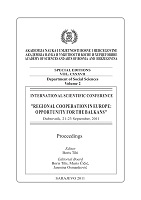REGIONAL INEQUALITIES OF HIGHER INTELLECTUAL CAPACITIES IN THE BALKAN COUNTRIES
REGIONAL INEQUALITIES OF HIGHER INTELLECTUAL CAPACITIES IN THE BALKAN COUNTRIES
Author(s): Gyula Horváth
Subject(s): Regional Geography, Higher Education , State/Government and Education, Sociology of Education
Published by: Akademija Nauka i Umjetnosti Bosne i Hercegovine
Keywords: Balkan Countries; Regional Inequalities; Higher education;
Summary/Abstract: The change of régime at the beginning of the 1990s produced a significant restructuring of the scientific potential of the Balkan countries. One characteristic common to all was a considerable reduction in scientific capacity. Two fields of research capacity shrank dramatically, one of these being the sectoral research institute network. The majority of research institutes funded by national bodies (such as ministries) were closed and the number of employees in academic research institutes declined equally dramatically. The reorganisation of the higher education system was the starting-point of a range of positive changes. In the new countries the number of undergraduates doubled or tripled, new colleges and universities were established and R&D was given an important role. Due to the specific spatial development of countries in the Balkans, the location of intellectual activities shows significant disparities. As a characteristic feature of late development, these countries are lagging behind Western and Central Europe in terms of university education and research and development (R&D) activities.
Book: INTERNATIONAL SCIENTIFIC CONFERENCE - REGIONAL COOPERATION IN EUROPE: OPORTUNITY FOR THE BALKANS
- Page Range: 21-31
- Page Count: 11
- Publication Year: 2011
- Language: English
- Content File-PDF

